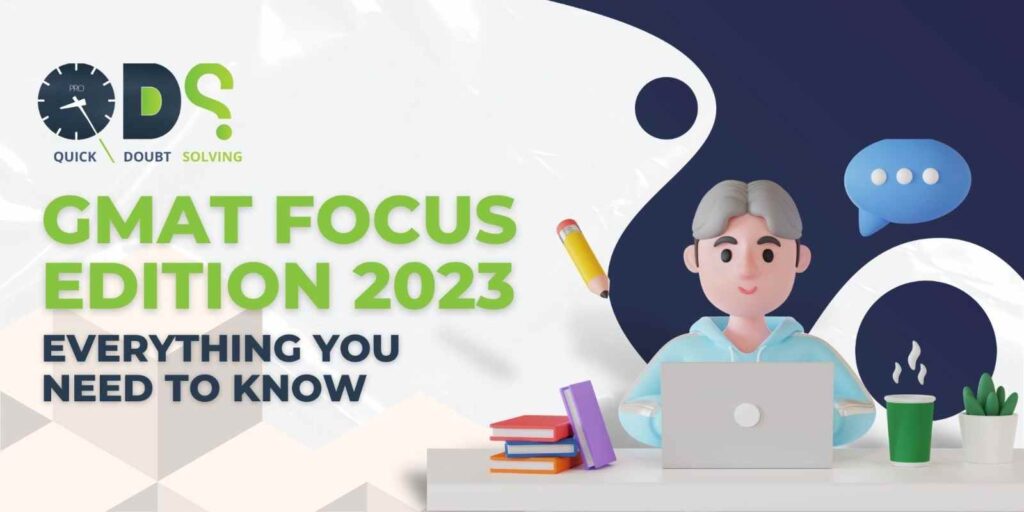If you want to be a leader in your business career, getting a Master of Business Administration (MBA) or another advanced business degree is the best way to go. It will give you more opportunities and prepare you for the business world better than any other qualification. You may have also heard of the GMAT, which is a widely accepted business school exam. Get ready for the GMAT Focus Edition, the newest version of the popular business school entrance exam. It’s really exciting!
What is the GMAT Focus Edition?
The GMAT Focus Edition is a game-changer. It is accepted by over 7,700 programs at more than 2,400 business schools worldwide. This edition is designed for today’s graduate business programs, making it easier, more flexible, and more informative for you to apply to top schools worldwide. It’s shorter by one hour, but it has valuable content focused on business that helps you succeed. The GMAC has made a big change to the GMAT test. They are launching a new test called GMAT Focus to make sure it stays reliable and accurate. The “GMAT Focus Edition” will be launched in late 2023. According to the Graduate Management Admission Council (GMAC), the organization that oversees the test, this option will be simpler and more practical for both business schools and applicants. Your GMAT exam scores will remain valid for five years. Secure your future by obtaining an excellent MBA education. Let the GMAT Focus Edition guide you towards success. The countdown for exam appointments starts on November 7, 2023.
How does New GMAT Focus Edition 2023 differ from previous versions?
The new GMAT Focus Edition has a simplified format that assesses your skills for graduate management programs. The GMAT Focus Edition 2023 has made some significant changes to its format:
- Shorter test timing
- Data Insights Section
- GMAT’s new scoring system
- You can now review and edit your answers to the questions.
- The improved Official Score Report will provide in-depth performance information.
Shorter Test Timing
The biggest change in the GMAT Focus edition 2023 is about the exam content. The GMAT has four sections: Quantitative Reasoning, Verbal Reasoning, Analytical Writing Assessment (AWA), and Integrated Reasoning. The GMAT Focus edition 2023 has made a significant change to the exam structure. They have decided to remove the AWA section completely.
- Quantitative reasoning: focuses on problem-solving abilities.
- Verbal Reasoning: assesses critical thinking and reading comprehension skills. It no longer includes sentence correction.
- Data Insights: This new section evaluates a candidate’s skills in understanding and using data, analyzing it, and applying it to real-life business situations.
The GMAT Focus edition is much shorter than the current GMAT. It only takes 2 hours and 15 minutes to complete, while the current version takes 3 hours and 7 minutes. The new exam has three sections: Quantitative Reasoning, Verbal Reasoning, and Data Insights. Each section lasts for 45 minutes.
Shortening the duration of the test can also help decrease fatigue, which means candidates can perform better during the exam. The new test format in the GMAT Focus edition is designed to make it easier for you to assess your critical reasoning and data literacy skills. It focuses on the skills that are important for success in the business world. Plus, it takes less time to complete the test.
Data Insights Section
The Data Insights section checks if you can understand and analyze data in different forms like tables and graphs. This skill is important in today’s fast-changing business world. This section combines Integrated Reasoning and Data Sufficiency question types to measure digital and data literacy skills. These skills are highly important and sought after in the business world. This part of the GMAT Focus Edition includes different question formats such as Data Sufficiency, Multi-Source Reasoning, Table Analysis, Graphics Interpretation, and Two-Part Analysis. This section has 20 questions. It asks you to think about how different types of information, like graphics, numbers, and language, relate to each other. The goal is to help you make well-informed decisions.
GMAT’s New Scoring System
The GMAT Focus Edition now uses a new score scale. Instead of focusing on scores, test takers and schools are encouraged to compare percentiles. Your GMAT Exam Focus Edition Total Score is determined by how well you do in all three sections of the exam. Each section is equally important in calculating your score.
Overview of Scoring
Total Score
Score range: 205-805
Score intervals: 10
Standard error of measurement: 30-40 points
Quantitative Reasoning Score
Score range: 60-90
Score intervals: 1
Standard error of measurement: 3 points
Verbal Reasoning Score
Score range: 60-90
Score intervals: 1
Standard error of measurement: 3 points
Data Insights Score
Score range: 60-90
Score intervals: 1
Standard error of measurement: 3 points
You can now review and edit your answers to the questions
Currently, the GMAT does not allow candidates to change their answers to the questions. The new GMAT focus edition lets you bookmark and review questions easily. You can also change up to three answers per section, as long as there is time left in that section. The GMAC says these changes will help candidates improve their test strategy. It is uncertain how this change will affect the computer’s ability to adapt to the test.
The Improved Official Score Report will provide in-depth performance information
After you finish the exam, the GMAT Focus Edition will give you a better Official Score Report. The updated GMAT now works similarly to an ESR. This report will help you understand your strengths and areas to focus on. The Official Score Report now shows how you did in each section, for each question type, your time management skills, and more!
Features GMAT Focus Edition GMAT Exam
Structure – There are three sections with a total of 64 questions. You can complete them in any order you prefer: Quantitative Reasoning, Verbal Reasoning, and Data Insights. Four sections (80 question): Quantitative Reasoning, Verbal Reasoning, Integrated Reasoning, and Analytical Writing Assessment.
Duration – 2 hours, 15 minutes 3 hours, 7 minutes
Total Score – scale 205–805 200–800
Sections Weightage – Each of the 3 sections carries the same weight in determining your overall score. There are only two sections, Quantitative Reasoning and Verbal Reasoning, that have the same weight in determining your total score.
Question Review & Edit – After finishing each section, you have the option to review any number of questions and make changes to up to three answers. Not Available
Viewing Your Score– Check your unofficial score right after the exam. You can usually access Official Score Reports online within 3-5 business days. See your unofficial score right after the exam. You can usually access Official Score Reports online within 7-10 business days.
Test Availability – You can schedule appointments for tests at a test center any day of the week, or take exams online at any time. You can schedule up to 6 months ahead. You can take tests any day of the week, including weekends. If you take the test online, you can do it at any time. You can schedule tests up to 6 months ahead of time.
Exam Attempts – You can take the exam up to 5 times within a year, and a total of 8 times in your lifetime, regardless of which version of the exam you take. You can take the exam up to 5 times within a year, and a total of 8 times in your lifetime, regardless of which version of the exam you take.
Scores Validity – 5 years 5 years
The following procedures can help you prepare for the GMAT Focus Edition:
Start preparing as soon as you can. Having more time allows you to prepare more effectively.
Start by taking a practice test. Here’s a preview of the GMAT Focus Edition. It assists in identifying your strengths and areas for improvement.
Instead of jumping around, concentrate on one topic at a time. To start, focus on studying Quant (math) and Verbal (language) subjects. Next, address Data Insights.
The GMAT Focus Edition covers fewer topics. It’s important to know this content well in order to do your best.
Once you have learned a topic, make sure to practice it frequently. To practice, try mixing different topics together.
Set aside time every day for studying. Make sure to dedicate a substantial amount of time to preparing for the GMAT exam.
Make sure to regularly take practice tests as your test day approaches. Take a look at your answers and identify areas where you can make improvements.
Keep in mind, these tips are only the start. Make sure to also explore our GMAT test prep programs when getting ready for the GMAT Focus Edition.




